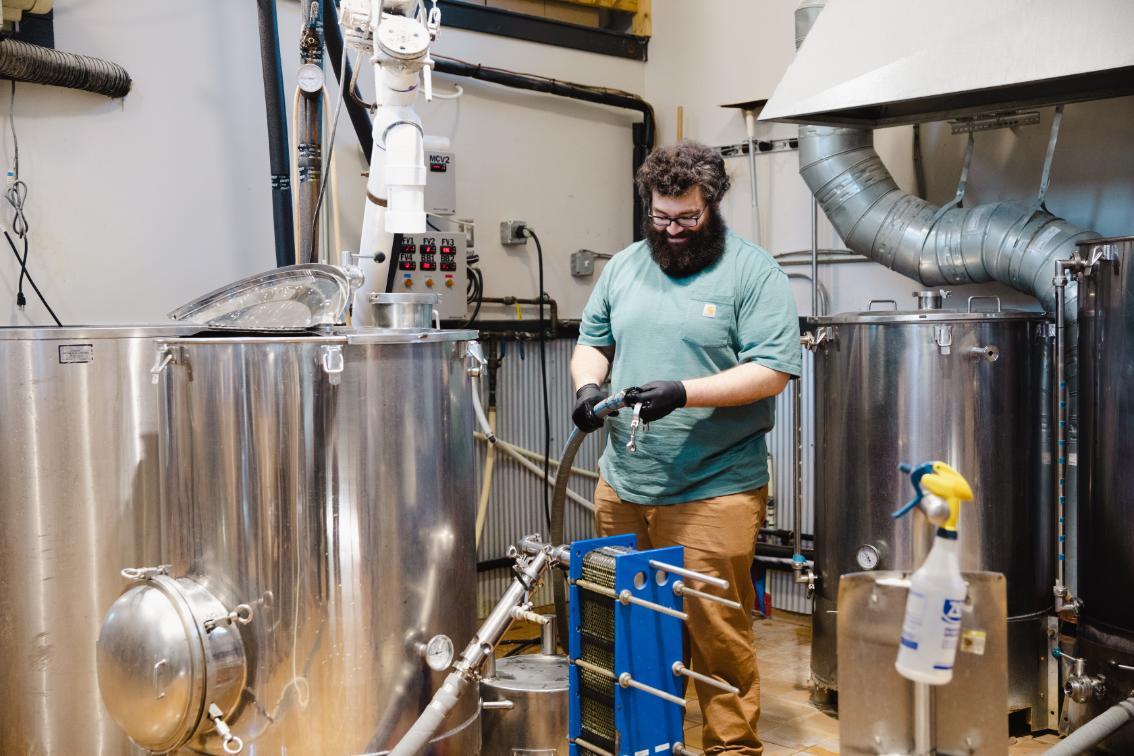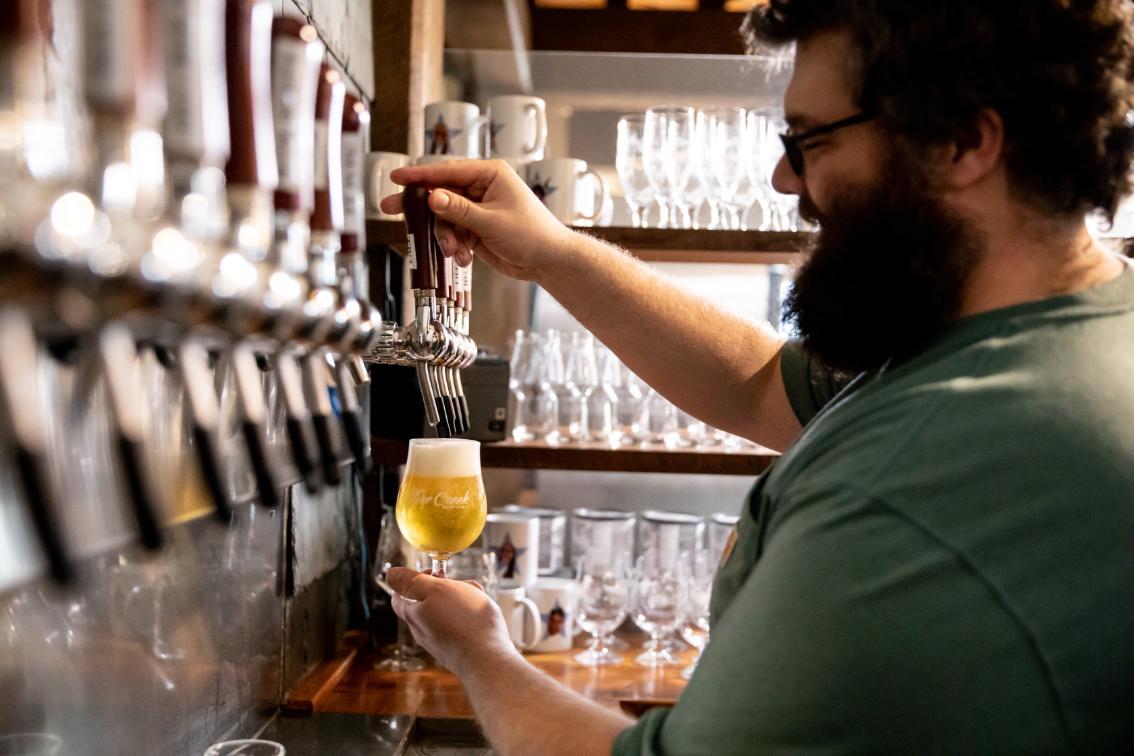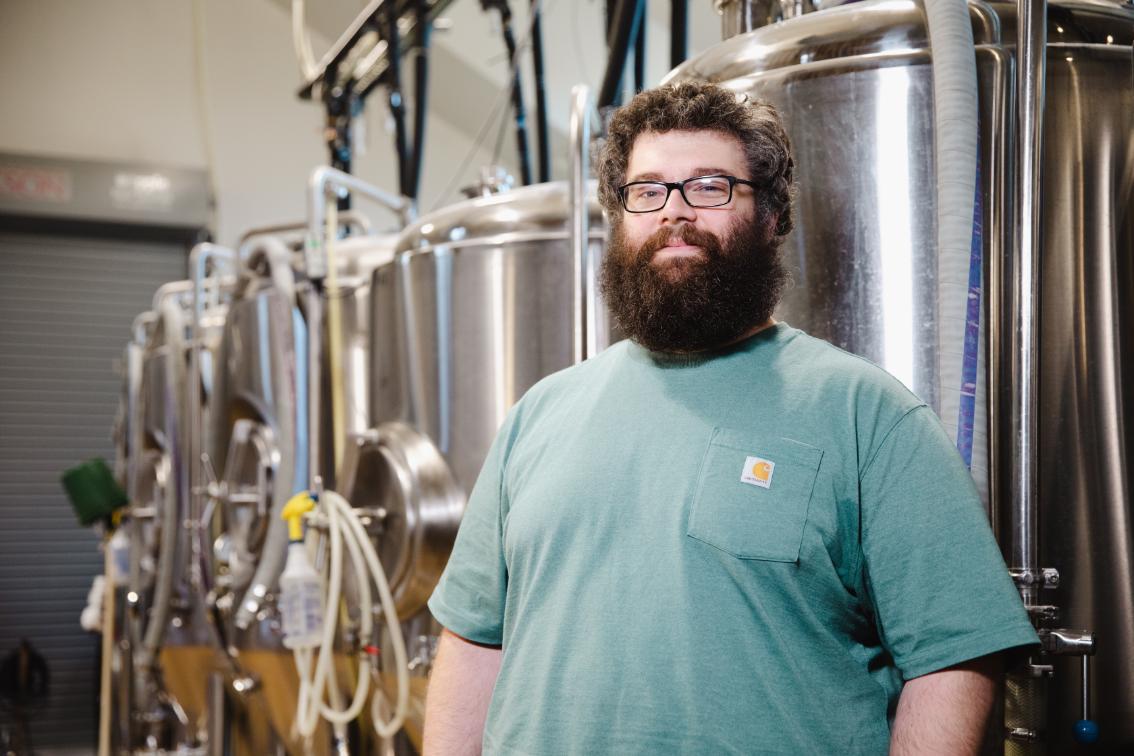As the saying goes, one man’s trash is another man’s treasure. For Brian Mandeville '10, head brewer at Fine Creek Brewing Company in Powhatan, Virginia, that treasure is grape pressings, called pomace, from local Virginia wineries that would otherwise be discarded as waste.
Each year Mandeville crafts a unique biére de vin based on the pomace he is utilizing. Last year it was a bright ruby barrel-aged saison blend with a lot of dark red fruit character from cabernet sauvignon skins from Blenheim Vineyards in Charlottesville. A previous creation was a light and tart pink-hued gose with notes of cranberry and raspberry made with Blenheim’s 2020 rosé pressings.
“These are some of my favorite products we make because you get a really brilliant color from the reds,” he said, adding that the beers can look very much like wine. “While the sugar is mainly extracted, those grape skins retain a lot of the tannins, and there’s still a ton of potential there. The flavors and aromas we’re able to get from them are impressive.”

Beer can play an amazing role in tying people back to the land and agriculture that is all around them.
Brian Mandeville '10 Tweet This
Mandeville’s use of pomace is just one example of his reconnecting with an American ingredient that has been lost to history due to the pressures of industrialization and modernization. He views beer as a form of storytelling—a way of honoring traditions and connecting people with a sense of place and with the land.
Mandeville is passionate about building that bridge to the past by working with locally sourced ingredients and highlighting local agriculture. He relishes using his brews as a way to introduce customers to an ingredient, such as black walnuts, that they wouldn’t come into contact with ordinarily.
“Beer can play an amazing role in tying people back to the land and agriculture that is all around them,” he said. “As a craft brewer, especially a small craft brewer, we have an opportunity to really revert back to those roots of making something that tells a story about where it’s from and the people who are behind it.”
To do that, Mandeville uses an eclectic culinary cornucopia of native ingredients. There are the pawpaws that grow in abundance along the brewery’s namesake creek, the chamomile plants grown in the gardens and dried in an old cheese cottage, and the native spicebush, which has a different flavor profile ranging from pepper to lemon to allspice to cinnamon based on which part of the plant is being used—the roots, leaves, stems or berries. A recent orange-hued spicebush and cherrywood Norwegian farmhouse ale utilized not only the spicebush but also wood from a felled cherry tree on the property.
People hear chamomile and they think of something very floral, but it really has a lot of citrus qualities to it. There’s this really nice green tea note. It just accents that beer so nicely.
Brian Mandeville '10 Tweet This
Other items Mandeville has foraged to incorporate in his brews include sassafras leaves, juniper, pine, yarrow, shiso (also known as perilla) and chanterelle mushrooms collected from Virginia’s Allegheny Highlands as part of a conservation project with the Nature Conservancy.
He enjoys pointing out that many of these ingredients, such as chamomile, have a longer history of being used in beer than hops. A brett saison, a slightly funky and fruity light beer made with chamomile, is one recent brew he was especially happy with.
“People hear chamomile and they think of something very floral, but it really has a lot of citrus qualities to it,” he said. “There’s this really nice green tea note. It just accents that beer so nicely.”
As head brewer at Fine Creek, a small-scale craft brewery and event venue, Mandeville wears lots of hats. He is part of a two-person brewing team. His job entails everything from sourcing ingredients to writing recipes to running the production schedule to developing partnerships with local farmers. Then there’s the actual process of making beer.
Mandeville has been at Fine Creek since 2019. He was drawn to the small scale of their production—they brew 100 gallons at a time and produce about 400 barrels annually. The majority of their beer is consumed on site.
When Mandeville graduated from Longwood in 2010 with a degree in political science and global politics, home brewing was a hobby and he had his sights set on a career in the foreign service. But the lingering effects of the great recession complicated his timing for going to graduate school. Instead, some friends suggested he turn his home brewing hobby into a career. He recalled that at the time, the prospect of making a living full time at brewing was not viewed as sustainable.

But it’s still very much a trade skill. I think the best way to learn brewing is hands on.
Brian Mandeville '10 Tweet This
He started driving around to breweries, hoping to get his foot in the door. Eventually he got the job at O’Connor Brewing in Norfolk, where he had the chance to apprentice under a brewer with 30 years of experience. Later he went back to school to help him better understand the science involved in the craft.
“That filled in those gaps and strengthened my understanding of a lot of the chemistry and microbiology that happens in the process,” he said. “But it’s still very much a trade skill. I think the best way to learn brewing is hands on.”
He also put his political science degree to use through lobbying efforts to change Prohibition-era laws that hamstrung the craft brewing industry. When he started brewing in Virginia a brewery was not allowed to have a tasting room. While he was working at a brewery in Durham, North Carolina, he served as co-chair of the legislative affairs subcommittee for the state brewers guild. The Tarheel State previously prohibited brewers from making beer stronger than 5 percent ABV (alcohol by volume). Changes in those laws paved the way for the explosion of breweries in Virginia and across the southeast in the past 15 years.
He credits his liberal arts education with helping to develop a foundation for thinking more contextually about how one person’s actions have a broader impact in the world. That’s also what informs Mandeville’s guiding principle that beer is a bridge tying people and places together.
“People drive by fields of grain all the time and have no idea what it is or where it’s going,” he said. “As a brewer we have the opportunity—and really a responsibility—to be the translator from those fields of grain to something that’s tangible and real that you can experience in a really tactile way.”



Leave a Comment